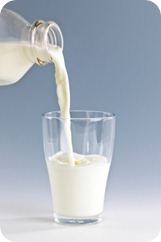This randomized, double-blind trial of children was conducted in women who received probiotic milk or placebo from 36 weeks of pregnancy to 3 months postpartum during breastfeeding. Women were given 250 mL of probiotic low fat fermented milk or 250 mL placebo skimmed fermented milk per day. The probiotic milk contained Lactobacillus rhamnosus GG (LGG), Bifidobacterium animalis (Bb-12) and Lactobacillus acidophilus (La-5) equaling 50 billion colony-forming unites of LGG and Bb-12 and 5 billion of La-5 per day. The study milk was given for 4 months. The children were to be breastfed during this time period. Children with an itchy rash for more than 4 weeks were evaluated for atopic dermatitis (eczema).
The incidence of eczema among the children at two years of age, of the mothers who drank the probiotic milk was significantly reduced. In addition the severity of the eczema was reduced in those who did acquire eczema and the primary preventive effect was most evident in children who did not have a family history of eczema or asthma.
Commentary: Overall, this and other research is convincing that probiotics reduce the incidence of eczema. The overall benefit of probiotics in this study is clear to those infants and children who do not have strong family histories of eczema and less clear to those children who are at high risk. For those infants… other strategies for mother during pregnancy and while breast feeding, as well as the first few years of the child’s life, include significant attention to dosing of omega-3 fatty acids from fish oils.
Reference
Dotterud C, Storro O, Johnsen R, Oien T. Probiotics in pregnant women to prevent allergic disease: a randomized, double-blind trial. British Journal of Dermatology 2010;163:616-623.


